
PRIMATES
Scope & Guideline
Championing high-quality research in primate science.
Introduction
Aims and Scopes
- Ecology and Behavior of Primates:
Research articles often explore the ecological dynamics of primate species, their social structures, and behavioral patterns, providing insights into their adaptation and survival strategies. - Conservation Biology:
The journal emphasizes conservation efforts and studies that assess the impact of human activities on primate populations, habitat suitability, and biodiversity, highlighting the importance of preserving primate species. - Comparative Studies:
The journal includes comparative analyses across different primate species, which enhance understanding of evolutionary relationships, behavioral ecology, and social interactions. - Methodological Innovations:
'PRIMATES' features studies that incorporate novel methodologies, such as genetic analyses, technological advancements (like UAVs), and advanced statistical techniques, to enhance the understanding of primate behavior and ecology. - Human-Primate Interactions:
Research addressing the impact of human activities on primates and their habitats, including urbanization, tourism, and conservation policies, is a significant focus area. - Cognitive and Social Behavior:
The journal publishes studies on the cognitive abilities and social behaviors of primates, contributing to the understanding of primate intelligence and social structure.
Trending and Emerging
- Technological Integration in Primate Research:
Studies utilizing advanced technologies such as UAVs, deep learning, and automated behavior recognition are on the rise, enhancing the efficiency and accuracy of data collection and analysis. - Conservation Genetics:
Research focusing on genetic diversity, population structure, and conservation genetics is gaining traction, highlighting the importance of genetic tools in understanding and preserving primate populations. - Impact of Climate Change:
There is an increasing focus on how climate change affects primate habitats and behaviors, as researchers seek to understand and mitigate the impacts of global environmental changes on primate species. - Social Network Analysis:
Emerging studies that analyze social networks within primate groups are becoming more prevalent, providing insights into social dynamics, cooperation, and competition among individuals. - Human-Wildlife Conflict and Management:
Research addressing the challenges of human-wildlife conflict, particularly in urban areas, is increasingly important as primates adapt to anthropogenic environments. - Health and Disease Ecology:
The exploration of health issues, including disease transmission between humans and primates, is becoming a critical area of study, particularly in the context of zoonotic diseases and conservation efforts.
Declining or Waning
- Traditional Behavioral Studies:
While behavioral studies remain important, there has been a noted decline in traditional observational studies without innovative methodological approaches, as researchers increasingly focus on integrating advanced technologies. - In-depth Anatomical Studies:
Research centered on detailed anatomical studies of primates has become less frequent, likely due to a shift towards more applied research focusing on conservation and behavioral ecology. - Single-Species Focus:
There has been a decline in studies focusing solely on a single primate species, with a trend towards more comparative and ecological studies that emphasize interspecies interactions and broader ecological contexts. - Historical Research:
Papers exploring historical or anecdotal accounts of primate research have decreased, as the journal prioritizes empirical studies with current relevance and implications for conservation. - Captive Primate Studies:
Research focusing exclusively on captive primates has waned, possibly as the field recognizes the importance of understanding primates in their natural habitats and the complexities of their interactions with the environment.
Similar Journals

BIOLOGICAL JOURNAL OF THE LINNEAN SOCIETY
Unveiling the intricacies of life through research.BIOLOGICAL JOURNAL OF THE LINNEAN SOCIETY is a prestigious, peer-reviewed journal published by Oxford University Press that serves as a leading platform for original research in the fields of ecology, evolution, behavior, and systematics. With its ISSN of 0024-4066 and E-ISSN 1095-8312, this journal has maintained an impressive Q1 ranking in the latest Scopus statistics, which firmly positions it among the top tier of journals in its category (ranked #197 out of 721). Established in 1969, it covers a broad range of topics crucial for understanding biodiversity and the evolutionary processes shaping it, with its coverage extended until 2024. Though it does not operate under an open-access model, it ensures wide visibility and dissemination of impactful research findings. The journal is key for researchers, professionals, and students dedicated to advancing knowledge in biological sciences, fostering interdisciplinary collaboration, and addressing pressing ecological challenges.
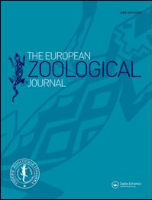
European Zoological Journal
Advancing the Frontiers of Animal ScienceEuropean Zoological Journal, published by Taylor & Francis Ltd, is an esteemed open-access publication dedicated to advancing the exciting field of zoology. Since its inception in 2017, this journal has progressively established itself as a vital resource for researchers, professionals, and students alike. With its Q2 ranking in Animal Science and Zoology as of 2023, the journal ranks in the 69th percentile among its peers, showcasing its influence and contribution to the discipline. The journal’s broad scope covers a wide range of topics within zoology, aiming to foster an understanding of animal biology and conservation efforts. As an open-access journal, it not only enhances the dissemination of knowledge but also encourages collaborative research across global communities. Situated in the United Kingdom, the European Zoological Journal invites submissions that contribute to the evolving discourse in animal sciences, and endeavors to support the scientific community in addressing pressing ecological challenges.
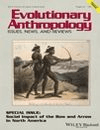
EVOLUTIONARY ANTHROPOLOGY
Unraveling the Complexities of Human Health and EvolutionEVOLUTIONARY ANTHROPOLOGY is a premier journal published by WILEY, dedicated to advancing the field of anthropology through innovative and rigorous research. With an ISSN of 1060-1538 and an E-ISSN of 1520-6505, this journal boasts a remarkable Q1 ranking in both the Anthropology and Medicine (miscellaneous) categories, reflecting its significant impact within the academic community. Since its inception in 1992, it has continuously evolved, now encompassing a wide array of subjects pertinent to evolutionary studies and human health. Residing in the highly competitive Scopus rankings, it stands at an impressive rank of 10 out of 502 in the field, placing it within the top 2% of journals in Social Sciences - Anthropology. Researchers, professionals, and students alike will find this journal an invaluable resource for the latest findings, theoretical advancements, and discussions that shape our understanding of human evolution and its biological implications. While not categorized as an Open Access journal, EVOLUTIONARY ANTHROPOLOGY remains a vital outlet for high-quality scholarship, fostering dialogue and enriching knowledge across diverse audiences.
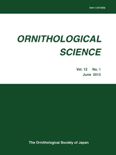
ORNITHOLOGICAL SCIENCE
Fostering impactful discourse in ornithological research.ORNITHOLOGICAL SCIENCE, published by the Ornithological Society of Japan in collaboration with the University of Tokyo, stands as a pivotal platform for advancing knowledge in the field of ornithology. With a keen focus on avian biology and conservation, this esteemed journal is dedicated to publishing high-quality research, reviews, and technical notes that explore the intricacies of bird science. Although currently categorized within the Q4 quartile in Animal Science and Zoology, the journal aims to elevate its standings by fostering scholarly communication and impactful scientific discourse. This journal has been consistently publishing since its inception in 2002, with a brief hiatus before resuming its invaluable contributions to the scientific community in 2009. Despite the absence of specific open access options, the journal remains a crucial resource for researchers, professionals, and students seeking to expand their understanding of avian ecology and behavior. Through its comprehensive scope, ORNITHOLOGICAL SCIENCE reflects the increasing importance of ornithological studies in addressing global biodiversity issues and conservation challenges.
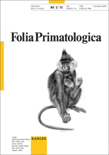
FOLIA PRIMATOLOGICA
Bridging Disciplines to Illuminate Primate ResearchFOLIA PRIMATOLOGICA is a prestigious academic journal published by BRILL, focusing on the interdisciplinary fields of animal science and zoology, as well as ecology and evolutionary biology. With an ISSN of 0015-5713 and E-ISSN 1421-9980, the journal has been a significant contributor to the understanding of primatology since its inception in 1963 and continues to disseminate impactful research through 2024. The journal is recognized in the Q2 quartile for Animal Science and Zoology and Q3 for Ecology, Evolution, Behavior, and Systematics, showcasing a solid reputation within the academic community. Both Scopus rankings and percentiles indicate its influence, with a rank of 137/490 in Animal Science and 277/721 in Ecology and Evolution, reflecting its relevance and commitment to promoting high-quality research. Though it does not operate on an open-access model, FOLIA PRIMATOLOGICA remains a vital resource for researchers, professionals, and students alike, striving to advance the understanding of primates and their ecological contexts within a global framework.
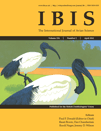
IBIS
Illuminating the path for ecological understanding.IBIS, published by WILEY, stands as a prestigious journal in the field of animal science, zoology, and ecology since its inception in 1859. With a focus on innovative research that informs the scientific community on ecological dynamics, behavioral studies, and conservation strategies, IBIS fills a critical niche for researchers, professionals, and students alike. The journal is recognized for its robust impact factor and commands a Q1 ranking in three key categories as of 2023, demonstrating its influence and reach within the global academic landscape, particularly in Animal Science, Ecology, Evolution, Behavior and Systematics, and Nature and Landscape Conservation. Although not an open-access publication, its rigorous peer-review process ensures high-quality contributions that advance knowledge in these vital areas. Through interdisciplinary collaboration and comprehensive coverage of cutting-edge topics, IBIS remains an essential resource for those striving to understand and protect our natural world.
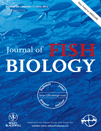
JOURNAL OF FISH BIOLOGY
Unveiling the Mysteries of Fish EvolutionJOURNAL OF FISH BIOLOGY, published by Wiley in the United Kingdom, is a distinguished peer-reviewed journal dedicated to advancing the understanding of the biology and relationships of fishes. With a robust history from its inception in 1969 to its future publications extending into 2024, the journal occupies a pivotal position in the academic landscape of aquatic sciences and ecology. Holding a notable Impact Factor and recognized within the second quartile (Q2) for both Aquatic Science and Ecology, Evolution, Behavior and Systematics, it serves as an essential resource for researchers, professionals, and students alike. The journal’s contributors delve into diverse topics ranging from evolutionary biology to conservation strategies, fostering a dynamic interchange of knowledge and innovation within the fish biology community. Access options are currently via subscription, ensuring high-quality, curated content that reflects the latest empirical research and theoretical advancements in the field.
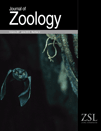
JOURNAL OF ZOOLOGY
Advancing knowledge in animal biology and ecology.JOURNAL OF ZOOLOGY, published by Wiley, stands as a premier scholarly journal in the fields of Animal Science and Zoology, renowned for its outstanding contributions to the knowledge of animal biology and ecology. With an impressive impact factor and a strong ranking in the Q1 category for Animal Science and Zoology, as well as Q2 for Ecology, Evolution, Behavior, and Systematics, the journal rigorously engages with both foundational research and groundbreaking discoveries since its inception in 1830. Located in Hoboken, New Jersey, this journal is dedicated to fostering the academic community's understanding of zoological sciences, providing access to important research that shapes wildlife conservation efforts and ecological studies. Although the journal does not currently offer open access options, it continues to attract significant attention, as evidenced by its strong Scopus rankings in related categories. Researchers, professionals, and students will find invaluable resources in the JOURNAL OF ZOOLOGY to advance their understanding of animal life and the ecological challenges it faces today.

ANIMAL BIOLOGY
Bridging Research and Ecological Awareness in Animal BiologyANIMAL BIOLOGY is a distinguished journal published by BRILL, focusing on the dynamic fields of Animal Science and Zoology, as well as Ecology, Evolution, Behavior, and Systematics. With an ISSN of 1570-7555 and an E-ISSN of 1570-7563, this quarterly journal serves as a pivotal platform for researchers and professionals seeking to contribute to the understanding of animal biology across diverse ecological contexts. The journal is recognized with a 2023 Scopus ranking of #234 out of 490 in the Animal Science and Zoology category, placing it within the 52nd percentile, alongside a rank of #409 out of 721 in Ecology, marking a solid contribution to the field. Although it currently holds a Q3 quartile in both categories, its commitment to quality research and novel insights continues to bolster its significance within the academic community. The open access option coupled with its publication history from 2003 to 2024 ensures a wide dissemination of knowledge, drawing in a global audience of researchers, professionals, and students eager to explore the intricacies of animal biology. By promoting high-quality discussions and innovative studies, ANIMAL BIOLOGY plays an essential role in advancing the understanding of life sciences and the evolution of biodiversity.

SPIXIANA
Elevating Academic Discourse in Animal ScienceSPIXIANA is a distinguished journal dedicated to the fields of animal science and zoology, published by VERLAG DR FRIEDRICH PFEIL in Germany. With the ISSN 0341-8391, it has been contributing to the scientific community since its inception, with volumes converging from 2008 to 2024. Although currently listed in the Q4 quartile of the 2023 category rankings for Animal Science and Zoology, it provides a vital platform for researchers and professionals to disseminate significant findings in the field. Despite being unindexed in open access, SPIXIANA ensures that vital research reaches its audience, enhancing academic discourse and furthering our understanding of zoological sciences. Its commitment to sharing rigorous scientific research make it an important resource for anyone passionate about animal biology and conservation.